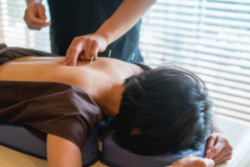|
MUIH’s Acupuncture and Oriental Medicine program is now accepting applications. |
Now more than ever acupuncture and Oriental medicine (AOM) is poised to play a significant role in the larger healthcare arena. This movement to include AOM is captured by recent developments in the governing bodies that guide how
 |
medicine is offered and reimbursed within in the U.S. and throughout the world. The World Health Assembly (the World Health Organization’s governing body) is responsible for generating the International Statistical Classification of Diseases and Related Health Problems (ICD). In its 11th version it will, for the first time ever, include codes related to acupuncture and Oriental medicine. This docment sets the medical agenda across the world and most importantly guides how coverage is determined by insurance companies and how physicians diagnose (Cyranoski, 2018).
More specifically in the U.S., Congress just passed H.R. 6, a bi-partisan bill titled: Substance Use-Disorder Prevention that Promotes Opioid Recovery and Treatment (SUPPORT). In this bill, there are a number of sections that include provisions that are relevant to acupuncture (NCCAOM, 2018). Cumulatively these efforts recognize the importance of AOM approaches to address many of the most challenging and pressing health issues in the U.S. and the world.
Maryland University of Integrative Health offers multiple programs in acupuncture and Oriental Medicine both at master’s level and doctoral level. These programs are unique in that while they include the various practices of Traditional Chinese Medicine (TCM) such as: acupuncture, moxibustion, Chinese herbal medicine, tui na (Chinese therapeutic massage), nutritional therapy, and qi gong and tai chi (specific movements or postures coordinated with breathing and mental focus), they also include Constitutional Five Element Acupuncture (CFEA).
CFEA is a complement to TCM in that it offers our graduates a way to more deeply access and engage healing and health in patients with longer-term chronic problems that are a mix of psychological and physical issues. Current reports and recent research (Hooten, 2016) continue to connect the importance of addressing the mind, body, and spirit in order to restore people to balanced health. Our AOM programs convey this healing acumen to our students, and graduates take this healing out into the world.
We would welcome an opportunity to speak to you about the AOM master’s and doctoral programs, your questions about the programs, and help you think through which program is right for you.
A member of our Admissions staff is available Monday through Friday between 9am and 5pm to answer any questions you have. The Office of Graduate Admissions also offers small group and individual information sessions by appointment. Speak to an Admissions Counselor today by calling 410-888-9048 ext. 6647 or emailing .
We are looking forward to hearing from you!
 |
Alexandra York, M.S., CHWC
Interim Department Chair for Acupuncture and Oriental Medicine
410‑888‑9048 ext. 6629
References
Hooten, W. M. (2016). Chronic Pain and Mental Health Disorders. Mayo Clinic Proceedings, 91 (7), 955-970.
National Certification Commission for Acupuncture and Oriental Medicine (NCCAOM). (2018, November 1). NCCAOM Advocacy Update Fall 2018. Retrieved from: http://www.nccaom.org/udvocacy-update-fall2018/
Cyranoski, D. (2018, September 26). Why Chinese medicine is heading for clinics around the world. Retrieved from: https://www.nature.com/articles/d41586-018-06782-7